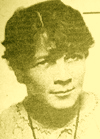Some random bits of science-fiction info, all having something to do with race:
The live-action version of Ursula LeGuin’s Earthsea was a disappointment. (Okay, I’m being polite; it was an abomination.) Let’s hope the animated version is better. Though judging from the poster it looks like they still haven’t figured out that Ged’s not a white dude.
- Check out the latest Galactica rumors about war between [SPOILER!] the metallic and humanoid versions of Cylons.
- I’ve blogged before about how Edgar Rice Burroughs’s views on race, while far from perfect, were more progressive than he’s usually given credit for. On the same lines, I just came across this review by Patrick Adkins of what sounds like an awful ERB bio.
- On a related subject, I was recently astonished to discover that a passage in ERB’s Pirates of Venus [by the way, it’s “illegal” to click the preceding link if you’re in the U.S., since apparently Pirates is in the public domain in Australia but not here; so of course none of my right-thinking U.S. readers would dream of doing so] has been interpreted (see here and here) as an expression of support for the Ku Klux Klan!
Well, here is the passage; judge for yourself:
“Sit close to us, Zog,” directed Kiron; “I have something to say that no one but a Soldier of Liberty may hear.” … He did not say Soldier of Liberty, but “kung, kung, kung,” which are the Amtorian initials of the order’s title. Kung is the name of the Amtorian character that represents the k sound in our language, and when I first translated the initials I was compelled to smile at the similarity they bore to those of a well-known secret order in the United States of America.
Is the narrator smiling at the pleasing coincidence that a pro-freedom organisation on Venus has the same initials as an Earth organisation he likewise regards as pro-freedom? Or is he smiling at the irony that a pro-freedom organisation on Venus has the same initials as an Earth organisation he regards as anti-freedom?
Taking this passage in isolation, there’s no way to decide between these two interpretations – as one of the critics admits, while nevertheless offering the following weaselly argument: “While he was probably no racist (even though some have accused him as one) he was certainly more right-wing than left-wing, and it is possible that he shared some of the Klan’s ideals. The quote does in no way prove this, but does give room for suspicion. Too much for comfort, unfortunately.”
Once we take the passage in the context of the Venus series as a whole, the first interpretation quickly becomes ludicrous. The Venus series represents a sustained satire of authoritarians and collectivists of all varieties, including Communists (“Thorists”), Nazis (“Zanis” whose obsession with “keeping the blood of Korvans pure” is ridiculed), and eugenicists (the people of “Havatoo,” who find the narrator genetically unfit and condemn him to die). Broaden the context still further, to recall Burroughs’s poem “The Black Man’s Burden,” parodying Kipling’s “The White Man’s Burden”; Burroughs’s satirical reversal of white supremacy in novels like Land of Terror and Beyond Thirty; his decision, highly unusual in the early days of science fiction, to depict other worlds (e.g. Mars and Pellucidar) as having black inhabitants, and moreover black inhabitants culturally and technologically the equal of the whites – not to mention his support for Native American rights in his westerns – and the notion of Burroughs as a Klan supporter begins to look remarkable silly. Okay, he was no Octavia Butler, but c’mon.
- While I’m on the subject of ERB and the various hues of human skin, here’s an odd feature of his book Gods of Mars [SPOILERS if you haven’t read it!]: First the Red and Green races find out that their religion is a hoax created by the White race; then the Whites finds out that their religion is a hoax created by the Black race; and finally the Blacks discover that their religion, in turn, is a hoax created by their own leaders. Seems like some literary critic should be able to have fun with that premise ….
 Unfortunately, the reviews are cutesy and idiotic (and in the case of Never Ask the End, factually inaccurate), and would never have tempted me to read the novels; but here they are: reviews of
Unfortunately, the reviews are cutesy and idiotic (and in the case of Never Ask the End, factually inaccurate), and would never have tempted me to read the novels; but here they are: reviews of